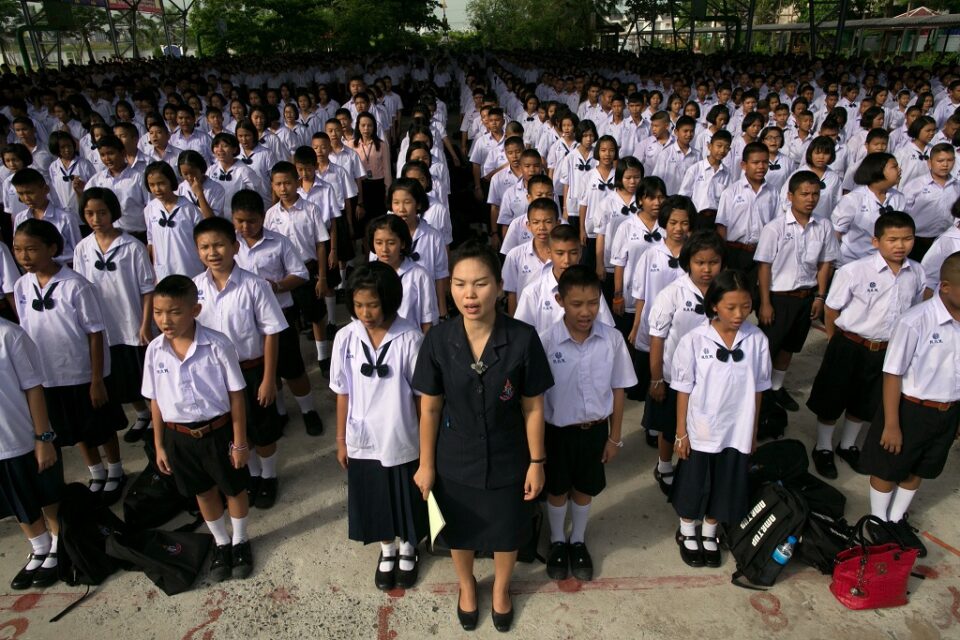Two key education bills have sailed through the first reading in the House of Representatives, despite warnings that both will seriously damage the quality of Thai education.
Among those worried is prominent educator Dr Sompong Jitradub, who says the National Educational Bill and the Learning Promotion Bill are “outdated” and do not represent much-needed educational reform.
“Today’s youngsters enjoy freedom, independence, democracy, diversity, and active citizenship.
But these two draft laws appear to promote centralization, dictating what children must do at each stage of their lives,” said Sompong, an education lecturer at Chulalongkorn University.
He was speaking after 435 out of the total 500 MPs approved both draft laws in principle on November 9. An ad-hoc committee is now reviewing the bills.
Setting up obstacles to learning?
Sompong says the bills focus on children’s duties and obligations, rather than guiding and encouraging them to explore.
For instance, the new legislation dictates that students aged from six to 12 learn about their rights and duties; pride in their nation, religion, monarchy and constitutional monarchy; the Sufficiency Economy Philosophy; planning for their future; and also become smart in math, science, technology, computers, Thai and foreign languages, culture and history.
They are also expected to start exploring career choices at this age.
Sompong believes the bills are designed to control children from an early age, teaching them skills/capabilities based on the state’s wants and needs. He says the process would be like “growing youngsters in a bottle” chosen by the government.
Though some argue that children have enough space for freedom, the Chula academic says an environment shaped by these new laws will only limit children’s curiosity and freedom.
Wiroj Lakkhanaadisorn, an MP and spokesman for the opposition Move Forward Party, agrees that the draft bills are aimed at establishing greater state control over young minds.
“There is no flexibility. Both teachers and children will be expected to do what the state wants,” he said.
The new legislation is being pushed at a time of increased pressure for national reform from the student-led anti-establishment movement.
Other flaws
Sompong singled out the National Education Bill for criticism, saying it offered no benefits for Thailand’s more than 10 million children.
The bill will barely touch the structure of the Education Ministry, which he identified as the root of Thailand’s many educational problems.
“Structural issues eat up most of the country’s educational budget,” Sompong said. “If we are going to stage reform, these issues must be addressed.”
He believes drafters of the law avoided tackling key structural issues over the fear of opposition from teachers.
“This draft law ignores big issues like quality of education, inequalities, and efficient use of resources,” Sompong continued.
He added that the law places far too much emphasis on training children for the labour market to boost the country’s competitiveness.
Thailand’s educational sector would take a step back if the bills became law, he warned.
Wiroj, meanwhile, pointed out that the bills fail to address important principles like freedom, rights and human dignity.
Positives?
While Sompong pointed to many failings, he also recognized that the National Educational Bill would establish a curriculum development institute.
“If this institute is set up, then the curriculum will truly be respected. Textbooks will no longer just be paper tigers,” he said.
He also likes the idea of establishing a National Educational Policy Committee chaired by the prime minister.
Yet he feels there are not enough positives to promote much-needed reform of Thai education.
“These [positive] things will only achieve about 30 percent of what proper educational reform can do,” he said.
What a supporter says
Atthaphon Sangkhawasee, secretary-general of the Education Council, defends the bill as practical and conducive to lifelong learning.
“Unlike the 1999 National Education Act, this bill focuses on learners’ capabilities and encourages children to see the direction their learning activities will take,” he said.
He explained that what children learn at each phase of their lives will give them an idea of what they can do for a living with the knowledge they have acquired. For instance, if a child drops out at Pathom 4, he or she will still know what to do to earn a living.
“We will also prepare secondary laws to support this new education law once it is enacted,” he said.
The secondary laws will mean students have data on what careers are available to them.
“Once the new educational law comes into effect, the National Education Policy Committee will shape the direction Thailand’s education sector takes. Funds allocated to education will be used more efficiently then, Atthaphon said.
He added that the new education law focuses not just on academic knowledge and theory, but also on life skills to ensure every student grows up to become a well-rounded human.
“We will integrate religion, art, culture and sports into the curriculum. With religious knowledge, students can become more disciplined and ethical,” he said. “With sports, they will be healthy, and with cultural knowledge, they will know about their roots, etc.”
He added that these well-rounded humans will grow up to become “quality people”.
Moreover, he said, the National Education Bill encourages lifelong learning. For instance, those who drop out at Mathayom 2 can return to school from this level instead of having to start all over again from Mathayom 1.
The draft law will also require state agencies to support schools in delivering educational services. This way, the education burden will not lie with schools alone, said Atthaphon.
And schools will not just get a flat rate of subsidies, but also extra help to fund infrastructure and learning materials.
Atthapon added teachers’ performance evaluation methods will also change to ensure they focus more on their students than on their own evaluations.
“The new method will focus on teaching efficiently,” he said.
Addressing criticism that the National Education Bill is outdated, Atthapon only said it was designed in line with the country’s 20-year national strategy and education-reform plan.
“I dare say children who benefit from this new educational law will show more creativity overall than the previous generation,” he added.
pps




